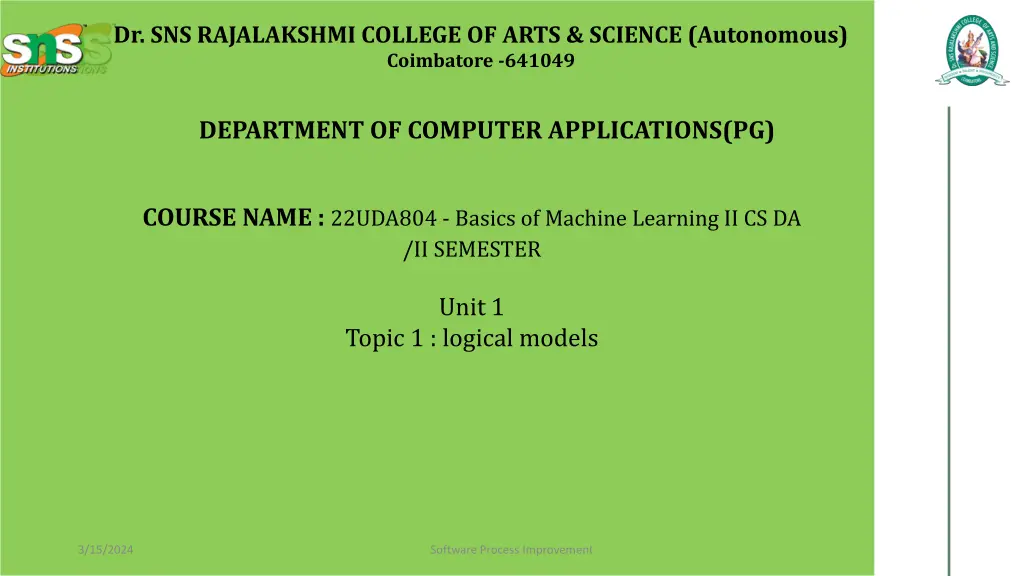
Understanding Logical Models in Machine Learning
Explore logical models in machine learning, which leverage formal logic and rule-based reasoning to make decisions. Key concepts include Propositional Logic, First-Order Logic, rules and inference, and symbolic AI. Discover types such as rule-based systems and Inductive Logic Programming, along with applications like expert systems and probabilistic logic models.
Download Presentation

Please find below an Image/Link to download the presentation.
The content on the website is provided AS IS for your information and personal use only. It may not be sold, licensed, or shared on other websites without obtaining consent from the author. If you encounter any issues during the download, it is possible that the publisher has removed the file from their server.
You are allowed to download the files provided on this website for personal or commercial use, subject to the condition that they are used lawfully. All files are the property of their respective owners.
The content on the website is provided AS IS for your information and personal use only. It may not be sold, licensed, or shared on other websites without obtaining consent from the author.
E N D
Presentation Transcript
Dr. SNS RAJALAKSHMI COLLEGE OF ARTS & SCIENCE (Autonomous) Coimbatore -641049 DEPARTMENT OF COMPUTER APPLICATIONS(PG) COURSE NAME : 22UDA804 - Basics of Machine Learning II CS DA /II SEMESTER Unit 1 Topic 1 : logical models 3/15/2024 Software Process Improvement
logical models Logical Models in Machine Learning Logical models in machine learning are based on formal logic and rule-based reasoning to make decisions. These models represent knowledge using logical expressions, rules, or symbolic structures and are often used in explainable AI (XAI). logical models
logical models 1. Key Concepts in Logical Models Propositional Logic: Uses Boolean variables (True/False) and logical operators (AND, OR, NOT). First-Order Logic (FOL): Extends propositional logic with quantifiers and predicates. Rules & Inference: Knowledge is represented as IF-THEN rules and used for reasoning. Symbolic AI: Models use symbols and relationships rather than numerical computation. logical models
logical models 2. Types of Logical Models A. Rule-Based Systems Definition: Uses predefined rules to make decisions. Examples: Expert Systems: Encodes expert knowledge as IF-THEN rules. Decision Trees: Uses a tree structure for rule-based classification. Applications: Medical diagnosis (Expert Systems). Fraud detection (Decision Trees). logical models
logical models B. Inductive Logic Programming (ILP) Definition: Learns logical rules from data using examples and background knowledge. Examples: FOIL (First-Order Inductive Learner): Learns rules from relational data. Progol: Uses Bayesian principles to guide rule discovery. Applications: Knowledge discovery from relational databases. Drug discovery (Inferring molecule properties). logical models
logical models C. Probabilistic Logic Models (PLMs) Definition: Combines probability with logic to handle uncertainty. Examples: Markov Logic Networks (MLNs): Extends first-order logic with probabilities. Bayesian Logic Programs: Integrates Bayesian inference with logical rules. Applications: Natural language understanding. Robotics (Uncertain reasoning in dynamic environments). logical models
logical models D. Answer Set Programming (ASP) Definition: A declarative programming approach for solving complex logical problems. Example: Dlv, Clingo (ASP solvers). Applications: Scheduling problems. Automated planning in AI. logical models
logical models logical models
